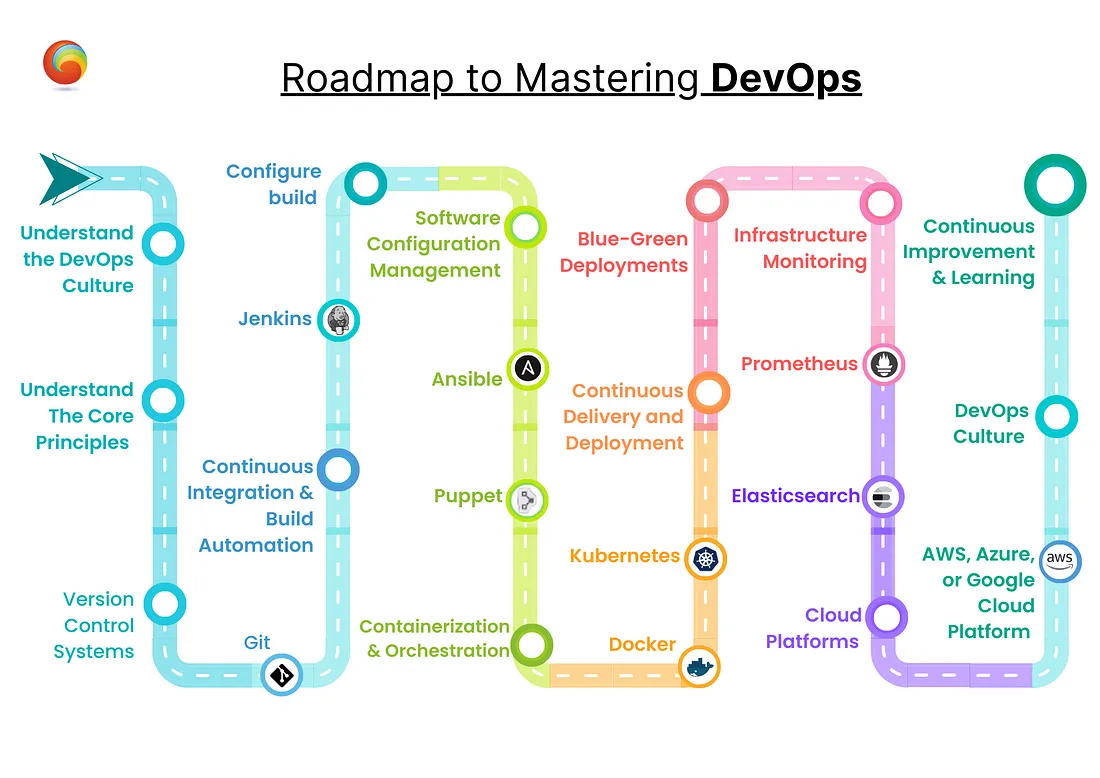DevOps has revolutionized software development by merging development and operations into a seamless workflow, enabling faster releases, improved collaboration, and increased efficiency.
As businesses strive to optimize their software delivery processes, mastering DevOps becomes essential for developers and operations professionals.
In this blog post, we present a comprehensive DevOps Roadmap to guide you on your journey to becoming a DevOps expert.

Understanding the DevOps Culture:
Start by understanding the core principles and cultural aspects of DevOps. Embrace a collaborative mindset, fostering communication and teamwork between development, operations, and other stakeholders.
Familiarize yourself with concepts like continuous integration (CI), continuous delivery (CD), and the importance of automation in streamlining the software development lifecycle.
Version Control Systems:
Master version control systems like Git, which are fundamental to DevOps practices and form a crucial part of the DevOps roadmap. Learn how to create repositories, manage branches, and collaborate effectively with other team members using Git. Understand concepts such as branching strategies, pull requests, and code reviews to maintain a clean and efficient codebase.
Continuous Integration and Build Automation:
Explore continuous integration tools such as Jenkins, CircleCI, or Travis CI. Learn how to automate the build and testing processes by integrating version control systems with these tools. Configure build pipelines that run automated tests, perform code quality checks, and generate build artifacts.
Software Configuration Management:
Gain proficiency in configuration management tools such as Ansible, Chef, or Puppet, which are essential components of the DevOps roadmap. Understand how to automate the provisioning and configuration of infrastructure resources and applications. Learn about infrastructure-as-code (IaC) concepts, where infrastructure is defined and managed using code, enabling reproducibility and scalability.
Containerization and Orchestration:
Delve into containerization technologies like Docker and container orchestration platforms like Kubernetes. Learn how to package applications into containers, manage containerized deployments, and scale applications seamlessly. Understand concepts like container networking, service discovery, and workload scaling to ensure efficient application deployment and management.
Continuous Delivery and Deployment:
Explore continuous delivery and deployment practices, an integral part of the DevOps roadmap, to automate the release process. Learn how to build pipelines that automatically deploy applications to different environments, such as development, staging, and production. Understand techniques like blue-green deployments, canary releases, and feature toggles to achieve continuous delivery with minimal disruption.
if you are interested in learning more about infrastructure monitoring and observability, Cloud Platforms and DevOps culture please continue reading the blog on our website where you will find more intriguing articles and blogs about many other such informative topics.
Click here!
By following this comprehensive roadmap, you’ll acquire the essential skills and knowledge needed to excel in DevOps practices.
Embark on your DevOps journey today and witness its transformational impact on your software development lifecycle.
